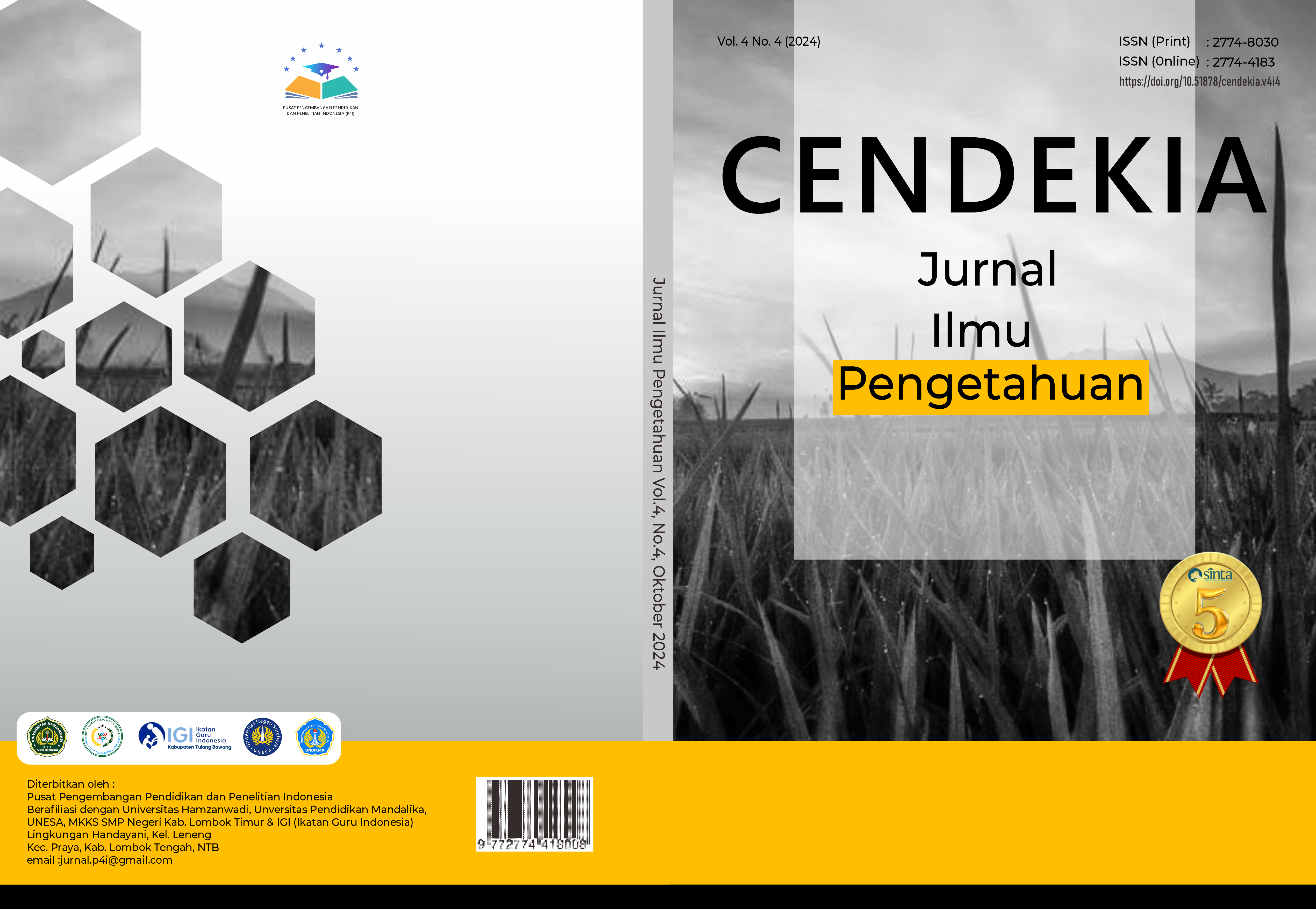PENGEMBANGAN E- MODUL BERBASIS FLIPPBOOK 3D UNTUK MENINGKATKAN HASIL BELAJARSISWA PADA MATA PELAJARAN IPS DI UPTD SMP NEGERI 1GUNUNGSITOLI
DOI:
https://doi.org/10.51878/cendekia.v4i4.4009Keywords:
E-Modul pembelajaran berbasis Flippbook 3D, kegiatan EkonomiAbstract
This research is based on the researcher's observation on the implementation of grade VII learning at UPTD SMP Negeri 1 Gunungsitoli. which has been experiencing problems in the learning process, so that students' interest in learning is still lacking, especially in social studies subjects. The objectives of the research are: (1) to find out the development of 3D-flippbook-based e-modules to improve student learning outcomes (2) to find out the feasibility of 3D-flippbook-based e-modules to improve student learning outcomes. (3) to determine the effectiveness of 3D flippbook-based e-modules to improve student learning outcomes. This study uses the research and development (R&D) method used to produce a specific product, and test the effectiveness of the product. The feasibility test of this media is based on the acquisition of material experts, media experts, linguists, using the validation sheet of material experts, media experts, and linguists, the results of the study stated that the Flippbook 3D-based e-module on economic activity materials by material experts obtained a percentage of 0.96% by linguists of 94.5% and media experts of 0.96% which each has very valid criteria. For the results of the individual test, a percentage of 77% was obtained with very practical criteria and in the field test, a percentage of 82% was obtained with very practical criteria. and on the effectiveness of learning media using learning outcome tests with the percentage of student learning completeness reaching 75% with effective criteria.
ABSTRAK
Penelitian ini dilatar belakangi dari pengamatan peneliti pada pelaksanaan pembelajaran kelas VII di UPTD SMP Negeri 1 Gunungsitoli. yang selama ini mengalami permasalahan dalam proses pembelajaran, sehingga minat belajar siswa masih kurang khususnya dalam mata pelajaran IPS. Adapun tujuan dari penelitian yaitu: (1) untuk mengetahui pengembangan e-modul berbasis flippbook 3D untuk meningkatkan hasil belajar peserta didik (2) untuk mengetahui kelayakan e-modul berbasis flippbook 3D untuk meningkatkan hasil belajar peserta didik. (3) untuk mengetahui keefektifan e-modul berbasis flippbook 3D untuk meningkatkan hasil belajar peserta didik. Jenis penelitian ini adalah peneitian pengembangan. Penelitian ini menggunakan metode research and development (R&D) metode penelitian yang digunakan untuk menghasilkan produk tertentu, dan menguji keefektifan produk tersebut. Uji kelayakan media ini berdasarkan peniaian ahli materi, ahli media, ahli bahasa, dengan menggunakan lembar validasi ahli materi, ahli media, dan ahli bahasa, hasil penelitian menyatakan bahwa e-modul berbasis Flippbook 3D pada materi kegiatan ekonomi oleh ahli materi diperoleh presentase 0,96% oleh ahli bahasa sebesar 94,5% ahli media sebesar 0,96% yang masing-masing berkriteria sangat valid. Untuk hasil pada uji perorangan didapatkan presentase sebesar 77% dengan kriteria sangat praktis dan pada uji lapangan didapatkan presentase 82% dengan kriteria sangat praktis, dan pada efektifitas media pembelajaran menggunakan tes hasil belajar dengan presentase ketuntasan belajar peserta didik mencapai 75% dengan kriteria efektif.
Downloads
References
Aprianka, S., Setiani, A., & Imswatama, A. (2021). Validitas E–Modul Berbasis Open Ended Meteri Sistem Persamaan Linear Dua Variabel Pada Pembelajaran Daring untuk Siswa SMK. Jurnal Cendekia: Jurnal Pendidikan Matematika, 5(3), 3111-3122. https://doi.org/10.31004/cendekia.v5i3.896
Dias, Kusuma Dewi, Lucia Tri Pangesthi, Sri Handajani, & Ita Fatkhur Romadhoni. (2023). Pengembangan E-Modul Berbasis Flip PDF Corporate Edition Pada Kompetensi Dasar Puff Pastry Siswa Kelas XII SMK . Journal of Creative Student Research, 1(2), 279–292. https://doi.org/10.55606/jcsrpolitama.v1i2.1503
Febdhizawati, E. H., Buchori, A., & Indiati, I. (2023). Desain E-Modul Flipbook Berbasis Culturally Responsive Teaching (CRT) pada Materi Transformasi Geometri. Jurnal Pendidikan Tambusai, 7(2), 5233–5241. https://doi.org/10.31004/jptam.v7i2.6544
Ismail, I., Sinaga, B., & Sriadhi, S. (2022). Analisis Kemampuan Pemecahan Masalah Matematis Siswa Melalui Penerapan E-Modul Flipbook Berbasis Pendekatan Santifik. Jurnal Cendekia: Jurnal Pendidikan Matematika, 6(3), 3307-3315. https://doi.org/10.31004/cendekia.v6i3.1499
Musarofah, M., & Watini, S. (2024). Pengembangan Literasi Digital di Era Teknologi Informasi melalui Channel TV Sekolah. Aulad: Journal on Early Childhood, 7(2), 261–276. https://doi.org/10.31004/aulad.v7i2.618
Nurmilah, N., Nana, & Sulistyaningsih, D. (2023). Pengembangan E-Modul Interaktif Berbasis Model Pembelajaran Poe2we Menggunakan Flipbook Maker Pada Materi Gelombang Bunyi Dan Cahaya. Jurnal Kumparan Fisika, 6(2), 107–118. https://doi.org/10.33369/jkf.6.2.107-118
Pahmawati, Pakpahan, I., Selegi, S. F., & Syaflin, S. L. (2022). Pengembangan E-Modul Berbasis Flipbook Materi Bumi Dan Alam Semesta Pada Pembelajaran IPA Kelas VI SDN Sukakarya. BADA’A: Jurnal Ilmiah Pendidikan Dasar, 4(2), 440–453. https://doi.org/10.37216/badaa.v4i2.649
Rahayu, E., Sadikin, A., & Hamidah, A. (2024). Pengembangan E-Modul Interaktif Berbentuk Flipbook Pada Materi Sistem Ekskresi Untuk Kelas XI SMA : (Development of an Interactive E-Module in the Shape of a Flipbook on Excretory System Material for Class XI SMA). BIODIK, 10(2), 210-220. https://doi.org/10.22437/biodik.v10i2.35172
Ramadhina, S. R., & Pranata, K. (2022). Pengembangan E-Modul Berbasis Aplikasi Flipbook di Sekolah Dasar. Jurnal Basicedu, 6(4), 7265–7274. https://doi.org/10.31004/basicedu.v6i4.3470
Utari, W. M., Gunada, I. W., Makhrus, M., & Kosim , K. (2023). Pengembangan E-Modul Pembelajaran Fisika Model Problem Based Learning Berbasis Flipbook Untuk Meningkatkan Keterampilan Berpikir Kreatif Peserta Didik. Jurnal Ilmiah Profesi Pendidikan, 8(4), 2724–2734. https://doi.org/10.29303/jipp.v8i4.1822


















